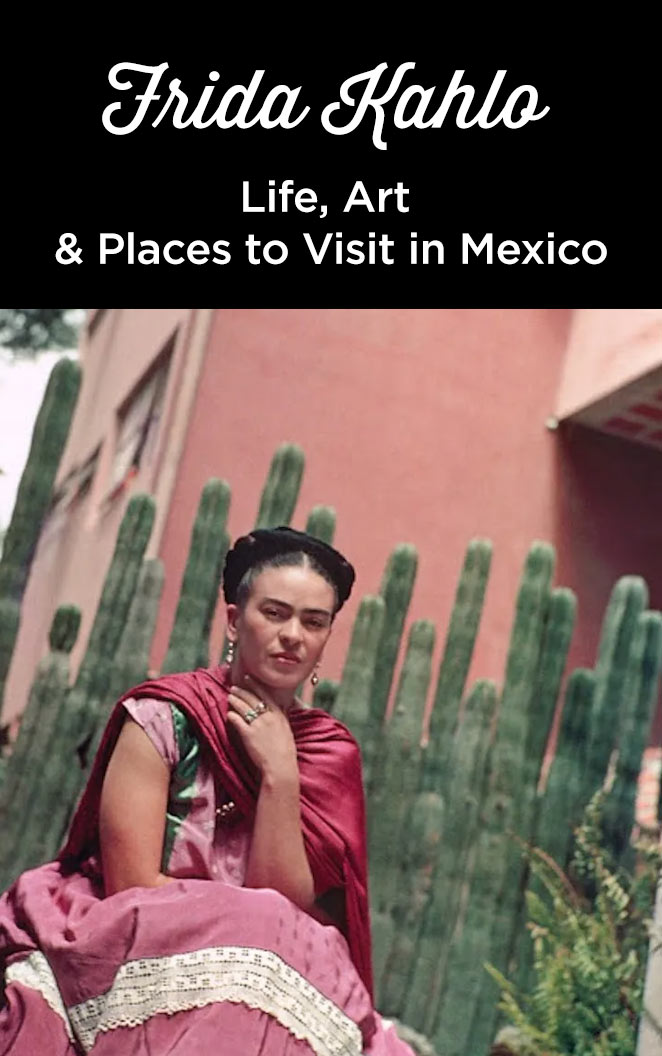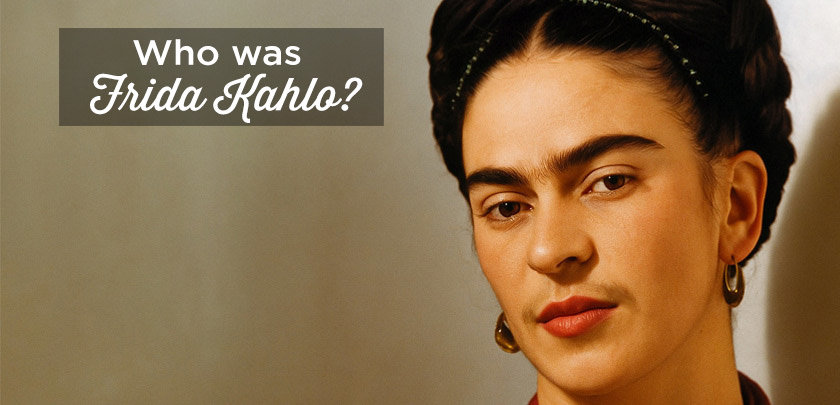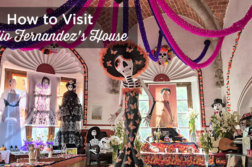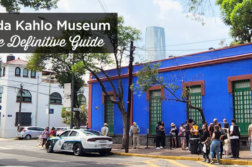Frida Kahlo: Life Story, Iconic Art & Where to See It in Mexico
Frida Kahlo is more than an artist – she is a global icon of art, feminism, and Mexican culture, whose influence resonates far beyond her homeland.
Her life, marked by resilience in the face of pain, her passionate and turbulent relationship with Diego Rivera, her unmistakable self-portraits, and her vibrant home in Coyoacán – now the famous Frida Kahlo Museum – continue to draw thousands of visitors from all over the world.
But who was Frida Kahlo, really? Why does her work still move millions, nearly 70 years after her passing?
In this complete guide, you’ll find Frida Kahlo’s biography, key milestones in her life, her love story with Diego Rivera, her most famous paintings, and the best museums in Mexico where you can admire her work.
We’ll also share powerful quotes, little-known anecdotes, and answers to the most common questions about this extraordinary artist.
Let’s discover the real Frida Kahlo.
Sommaire
- Frida Kahlo: Life Story, Iconic Art & Where to See It in Mexico
- 1. Who was Frida Kahlo?
- 2. The relationship between Frida Kahlo and Diego Rivera
- 3. Frida Kahlo and suffering (illness, accident, resilience)
- 4. Frida Kahlo’s most famous works
- 5. Famous Frida Kahlo quotes
- 6. Why has Frida Kahlo become a global icon?
- 7. Where to see Frida Kahlo in Mexico?
- 8. Films and documentaries to discover
- 9. Top 10 Fun Facts about Frida Kahlo
- 10. FAQ about Frida Kahlo
- 10.1 Who was Frida Kahlo?
- 10.2 Why is Frida Kahlo so famous?
- 10.3 What is Frida Kahlo’s best-known painting?
- 10.4 Where can you see Frida Kahlo’s work?
- 10.5 Can I visit Casa Azul in Mexico City?
- 10.6 Do I need to book tickets for the Frida Kahlo Museum in advance?
- 10.7 Where is Frida Kahlo’s house?
- 10.8 Which film recounts the life of Frida Kahlo?
- Staying in Mexico City
- How to find the best price for your flight ticket
- Rent a car in Mexico City
- You’re traveling in Mexico? These articles will help you!
1. Who was Frida Kahlo?
Frida Kahlo was born Magdalena Frida Carmen Kahlo y Calderón on July 6, 1907 in Coyoacán, a district south of Mexico City.
She was confronted with illness from an early age: at 6, she contracted poliomyelitis, which left her right leg thinner than the other. At 18, she was involved in a serious bus accident that changed the course of her life.
Bedridden for months, she began to paint from her bed, using a mirror hung from the ceiling.
Her painting quickly became an intimate and powerful means of expression. Frida often portrayed herself as wounded, divided, melancholy or a fighter.
In 1929, she married the famous painter Diego Rivera, with whom she maintained a relationship as passionate as it was tormented. Together, they participated in the intellectual and political life of post-revolutionary Mexico, between committed art, communism and national identity.
Her style of dress, inspired by Mexican traditions, was an integral part of her artistic identity. In fact, her mother was from Oaxaca, a region with strong indigenous traditions that left their mark on Frida’s visual universe.
This choice of clothing affirmed her attachment to Mexico’s indigenous roots, while also enabling her to camouflage certain physical scars.
She was recognized during her lifetime, but it was only after her death in 1954 that her work was fully rediscovered and celebrated.
The film Frida, released in 2002 with Salma Hayek in the lead role, also did much to make Frida Kahlo ‘s life and work known worldwide.
Today, she is considered one of the most important artists of the 20th century, and a global icon of feminism and the freedom to be oneself.
It’s the perfect place to immerse yourself in her world! Tickets go fast, so don’t miss my Detailed Guide to Casa Azul with all my practical tips and options for buying tickets in advance.
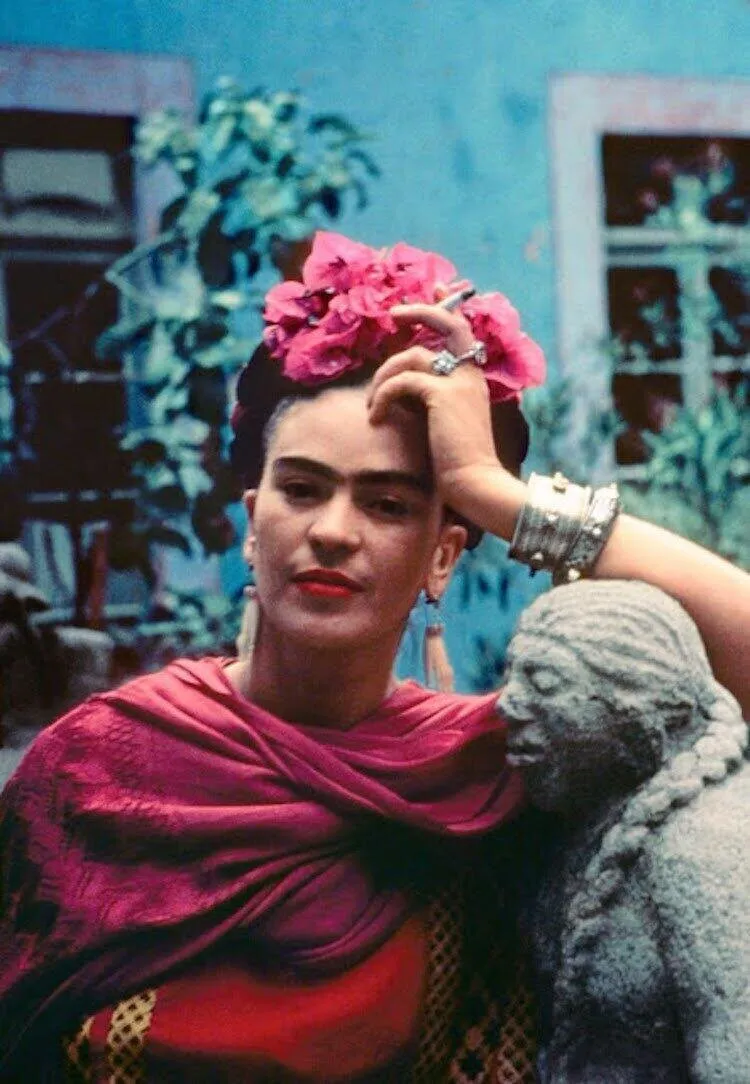
2. The relationship between Frida Kahlo and Diego Rivera
Frida Kahlo met Diego Rivera in 1922 at the Colegio de San Ildefonso in Mexico City‘s historic center, while Diego was painting the mural “La Creación”. At the time, Frida was only 15 years old and attending the National Preparatory School.
Diego, on the other hand, was already 37 and enjoyed a solid reputation in the Mexican art world.
If today we often speak of Diego as Frida’s husband, we should remember that at the time, it was the other way around: Frida was best known as the wife of Diego Rivera, one of the country’s most famous artists.
She would become an icon much later.
Would you like to find out more about this major artistic movement and discover where to admire these works in Mexico City? Here’s My Article on Muralism in Mexico City!
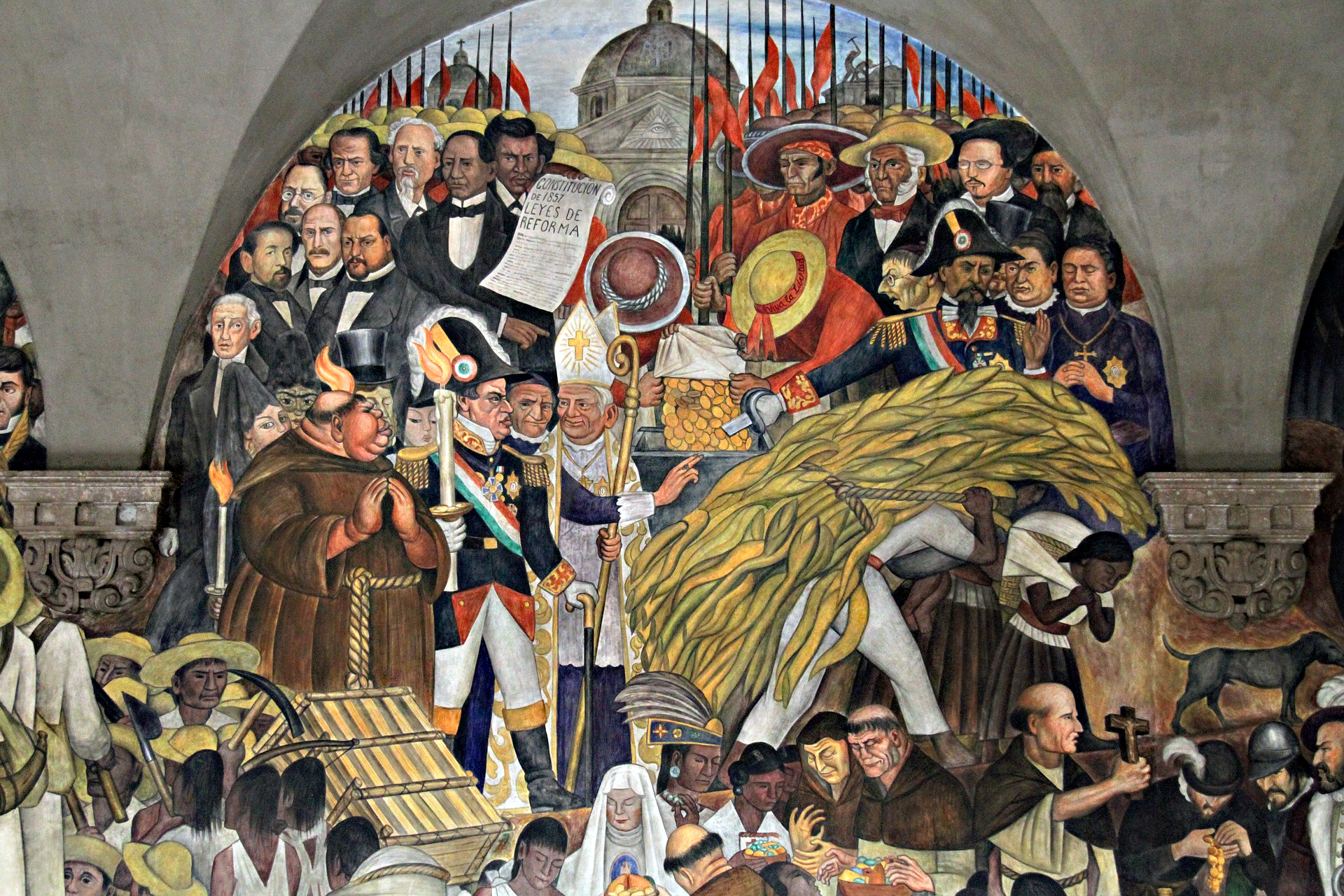
Their relationship was much talked about: unconventional, free and passionate, it was widely criticized for its time. Both had openly extramarital affairs, a fact that still sometimes shocks people today.
Their complex love story was marked by separations, reunions and a unique form of artistic and intellectual fidelity.
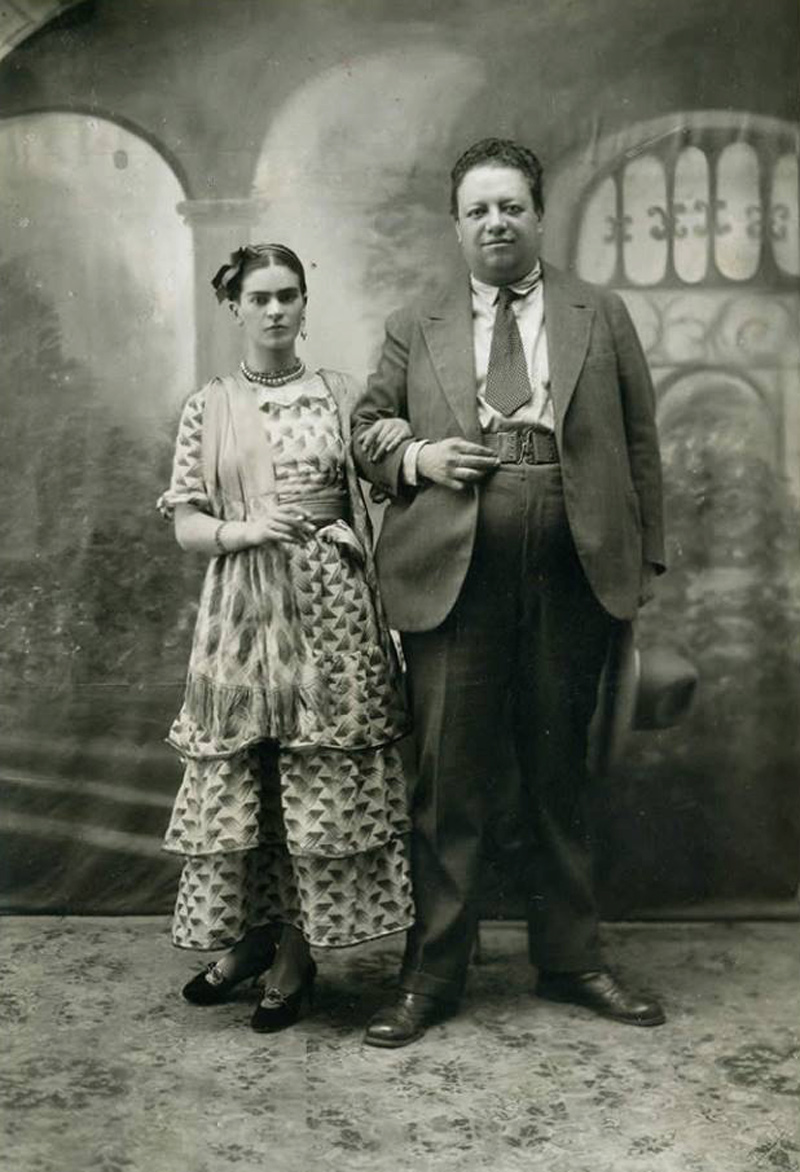
In 1932, construction began on their studio home in Mexico City’s San Ángel district. The idea was clear: two houses linked by a bridge, so that each could keep his own space. They didn’t move in until 1934, on their return from three years in the United States.
Today, the building can be visited under the name Museo Casa Estudio Diego Rivera y Frida Kahlo. Diego’s works are on display, as are the couple’s personal objects, and the unique atmosphere provides an insight into their daily artistic life.
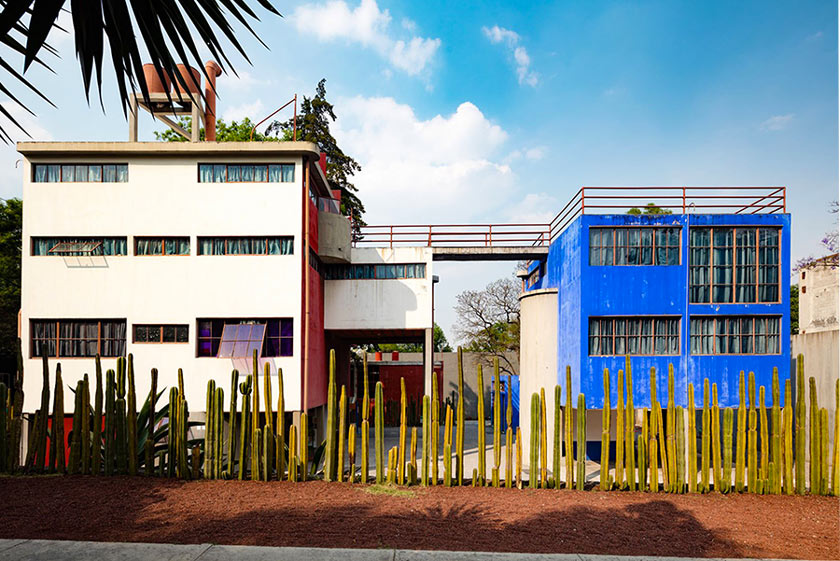
Six years later, in April 1941, after the death of her father, Frida returned to live in the family home in Coyoacán, now known as Casa Azul. She spent the last years of her life there, dying on July 13, 1954.
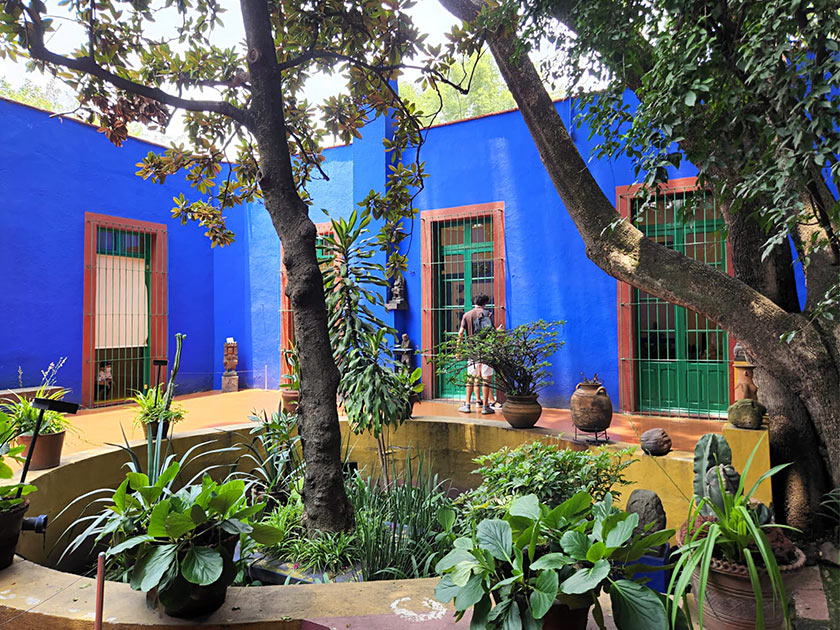
3. Frida Kahlo and suffering (illness, accident, resilience)
It’s impossible to talk about Frida Kahlo without mentioning suffering.
Illness affected her from childhood: at the age of 6, she contracted poliomyelitis, leaving one leg thinner and shorter than the other.
But it was a bus accident in 1925, when she was 18, that marked a turning point. Frida was seriously injured: fractured spine, broken pelvis, crushed right leg and foot, collarbone, ribs… Doctors doubted she would ever walk again.
She underwent numerous operations throughout her life, often remaining bedridden for long periods. It was during these times that she began to paint on a more regular basis, first to pass the time, then as an outlet for her physical and psychological pain.
Suffering is omnipresent in her work, but never self-indulgent. Paintings such as “The Broken Column”, in which she depicts her split torso supported by a metal structure, convey the brutality of her pain and medical treatment. Other works, such as “Henry Ford Hospital”, also evoke her miscarriages and her relationship with the body.
You’ll see her hand-painted orthopedic corsets, prostheses, canes, even adapted shoes – all objects that bear witness to her daily battle against pain, and the way she transformed suffering into artistic expression.
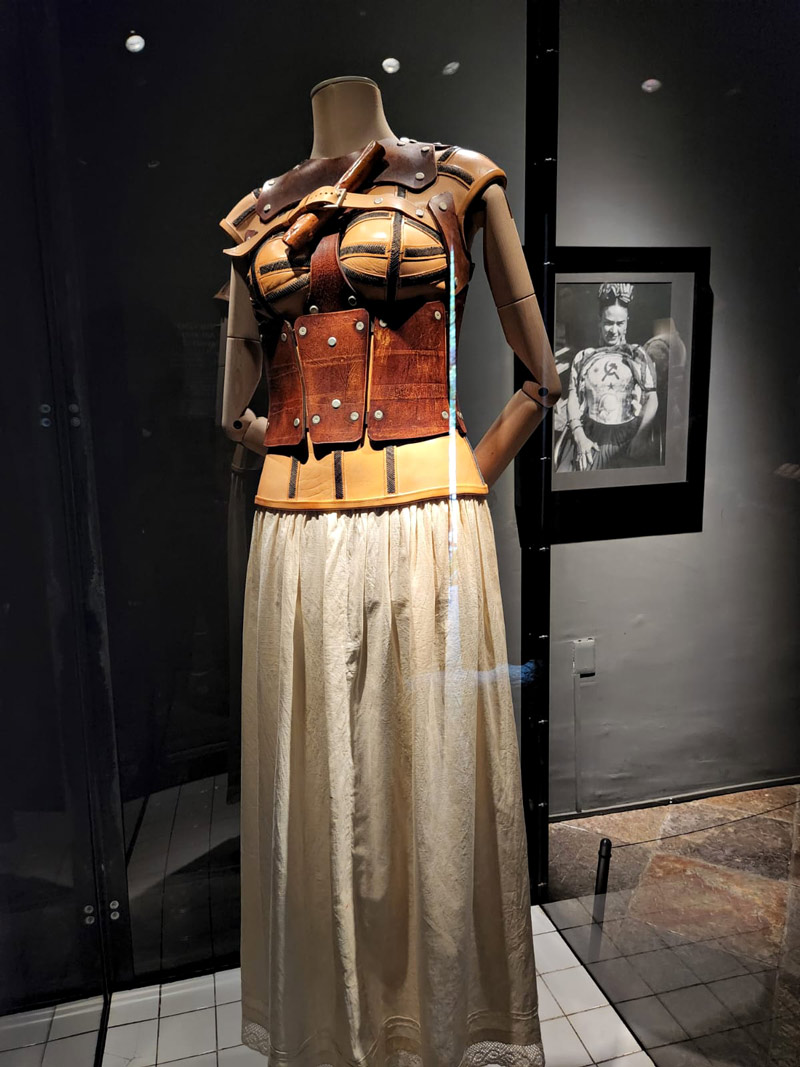
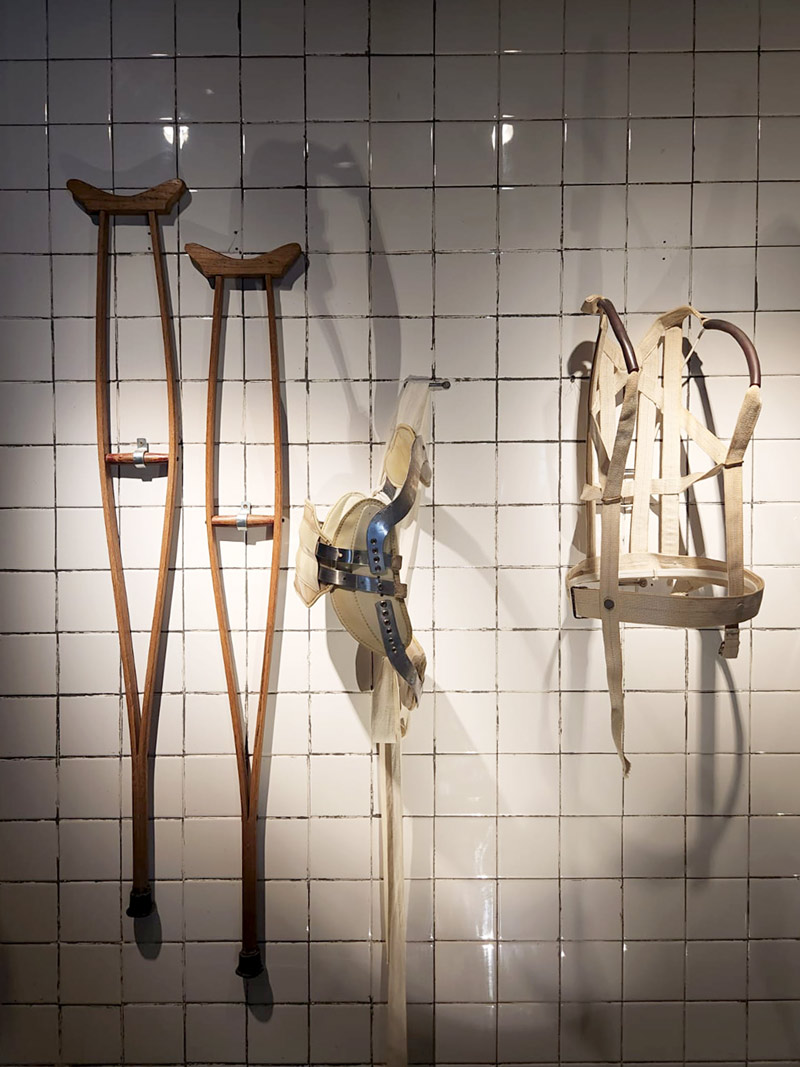
4. Frida Kahlo’s most famous works
Frida Kahlo produced around 200 works, most of them self-portraits.
Through her paintings, she expressed her physical pain, her feelings of love, her Mexican identity and her political commitments.
Here is a selection of her best-known works, which can be found in museums throughout Mexico and the world.
- The Broken Column (1944): One of her most poignant works, in which she depicts herself naked with a broken ionic column in place of her spine.
- Self-portrait with cut hair (1940): In this painting, Frida paints herself dressed in a male costume, holding scissors, with her hair cut on the floor.
- The Two Fridas (1939): Two versions of herself, connected by an artery, one in European dress, the other in traditional Mexican dress.
- Frida and Diego Rivera (1931): A double portrait of their complex relationship, often exhibited to illustrate their artistic and personal union.
- The Wounded Deer (1946): A symbolic self-portrait in which Frida depicts herself as a deer pierced by arrows, blending pain, fatality and mystical elements.
- Still life: Viva la vida (1954): This is one of her last works, depicting brightly-colored watermelons with the inscription “Viva la vida”. A strong, luminous message, painted shortly before his death, which contrasts with the omnipresent pain in his other paintings.
In Mexico City, many of her works are now housed in the Frida Kahlo Museum (Casa Azul), the Museum of Modern Art and the Dolores Olmedo Museum, which will reopen in 2026.
Other paintings can be seen at MoMA in New York and LACMA in Los Angeles.
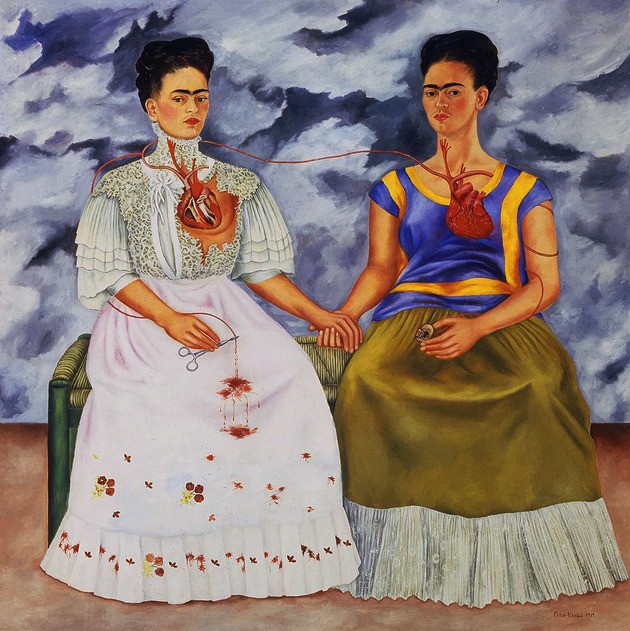
5. Famous Frida Kahlo quotes
Frida Kahlo was not only a visual artist, she also had a strong, poetic and committed pen.
Many of her phrases have become symbols of resilience, love, pain and freedom. Here’s a selection of her best-known quotes, translated into English.
- “I paint flowers so they don’t die”
- “I’ve suffered two serious accidents in my life: one when a streetcar ran me over, the other was Diego.”
- “Feet, what good are you if I have wings to fly?”
- “I’m not sick. I’m broken. But I’m happy to be alive as long as I can paint.”
- “I paint myself because I’m often alone and I’m the person I know best.”
- “I’ve never painted my dreams, I’ve painted my reality. I’ve painted my reality.”
- “Nothing is more precious than laughter. It takes strength to laugh and let go, to be light. Tragedy is the most ridiculous thing there is.”
- “Fall in love with yourself. With life. And then with whomever you want.”
- “Our passage on this earth is so absurd and ephemeral, that only the idea of having been authentic, of having succeeded in being as close to myself as possible, reassures me.”
- “Doctor, if you let me drink this tequila, I promise not to drink it at my funeral. ” – My favorite 😉
These quotes are often featured in exhibitions, books, documentaries and even on everyday objects.
6. Why has Frida Kahlo become a global icon?
Frida Kahlo fascinates people far beyond the art world.
Her life was marked by immense physical suffering due to a streetcar accident, numerous operations and chronic illness. Yet she has managed to transform this pain into art and personal commitment. This makes her a true symbol of resilience.
Despite her trials, her life remained full of color, creativity and passion. Frida painted from her bed, with plaster corsets and constant pain, but without ever losing her inner strength. She never let her suffering define her.
Frida was ahead of her time: she fully embraced her body, her sexuality, her political opinions, and asserted her freedom in a society that was still very conservative.
She also became a figure of feminism. Entire generations of women (and men) recognize themselves in her independence and sincerity.
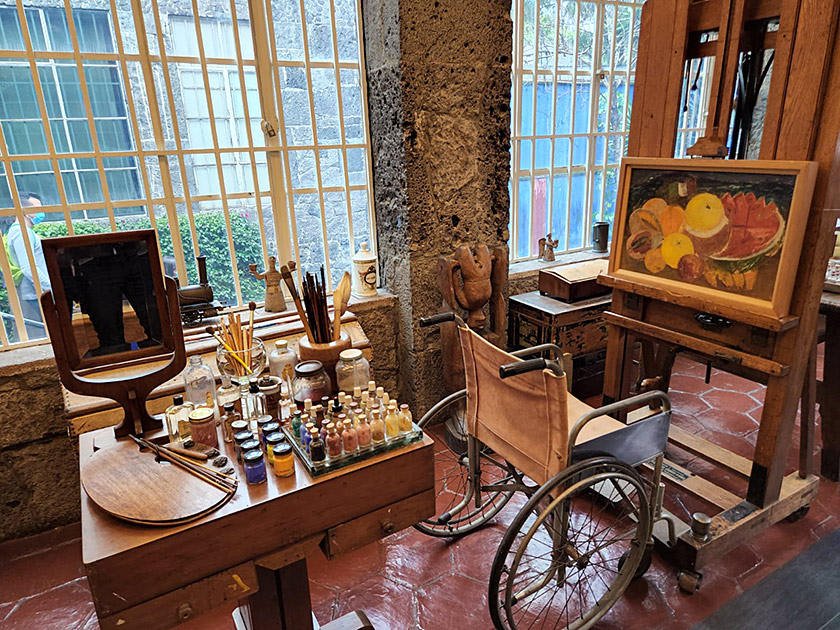
7. Where to see Frida Kahlo in Mexico?
You want to follow Frida Kahlo‘s footsteps? Good news: there are several places in Mexico where you can gain a better understanding of her world and legacy. And it all starts in Mexico City.
The must-see is undoubtedly Casa Azul, her birthplace in the Coyoacán district. This is where she was born, lived, painted and died. Now transformed into a museum, Casa Azul immerses visitors in her intimacy: her paintings, personal objects, medical corsets and even her kitchen have remained intact.
Not far from here, you can also visit the Diego Rivera – Anahuacalli Museum, designed by her husband. Here you’ll discover his collection of pre-Hispanic artefacts and a fascinating lava stone building.
Other places of interest include Mexico City’s Museum of Modern Art, which houses several of her works, and the Dolores Olmedo Museum, currently undergoing renovation, where some of her most famous pieces will be on display again from 2026.
Finally, in Mexico City’s San Ángel district, you can visit Frida and Diego’s home and studio (now the Casa Estudio museum), another important place to learn about their personal and artistic history.
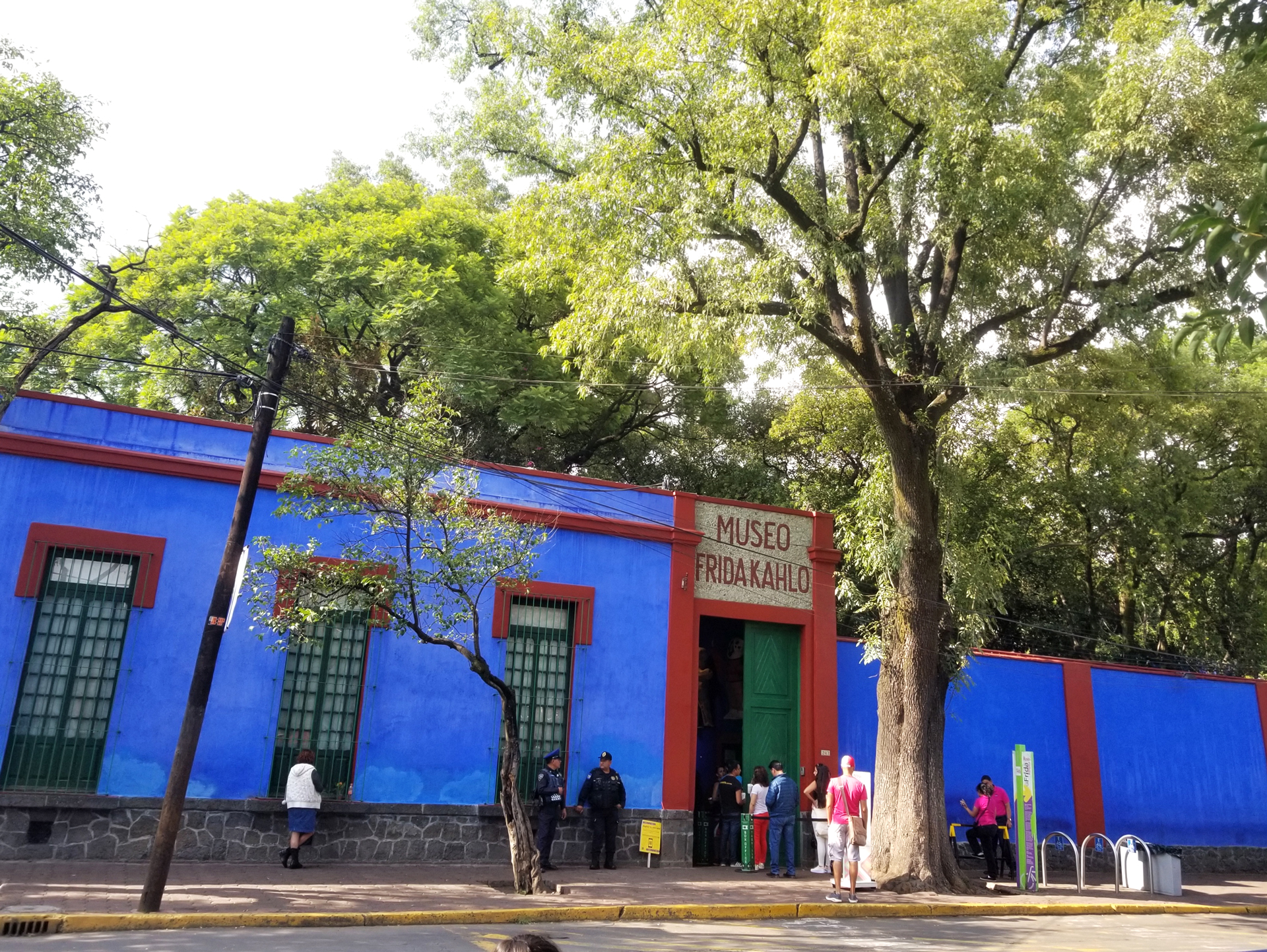
8. Films and documentaries to discover
Want to extend your immersion in the world of Frida Kahlo? Here’s a selection of must-see films and documentaries to help you better understand her life, work and times.
- “Frida” (2002): directed by Julie Taymor, starring Salma Hayek. It retraces the major stages in Frida Kahlo’s life, from her accident to her artistic career and her relationship with Diego Rivera.
- “Frida” (2024): an animated documentary available on Amazon Prime, directed by Carla Gutiérrez. It uses Frida’s words, taken from her notebooks and letters, and adds animations inspired by her works.
- Becoming Frida Kahlo: a three-episode documentary mini-series that traces the major stages of Frida’s life through her writings and historical context. Broadcast by the BBC and available on YouTube or Arte, depending on the country.
- Frida, naturaleza viva (1983): a cult Mexican film, shot in part at Casa Azul, offering a local, poetic interpretation of the artist’s life. A powerful work, less well known to the general public.
9. Top 10 Fun Facts about Frida Kahlo
Here are 10 fun facts about Frida Kahlo:
1. She lied about her date of birth
Frida said she was born in 1910 (instead of 1907) to match with the Mexican Revolution
2. She wore traditional costumes… like a suit of armor
Tehuanas dresses paid tribute to Mexican culture, but also hid her medical corset and weakened leg.
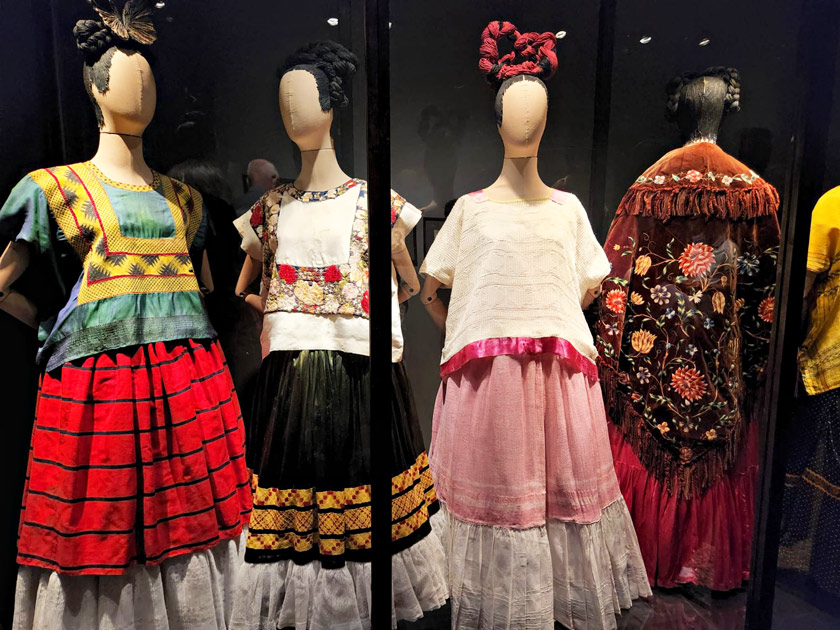
3. She painted in bed thanks to a ceiling mirror
Bedridden after her accident, she painted self-portraits using a special easel and a mirror installed by her father.
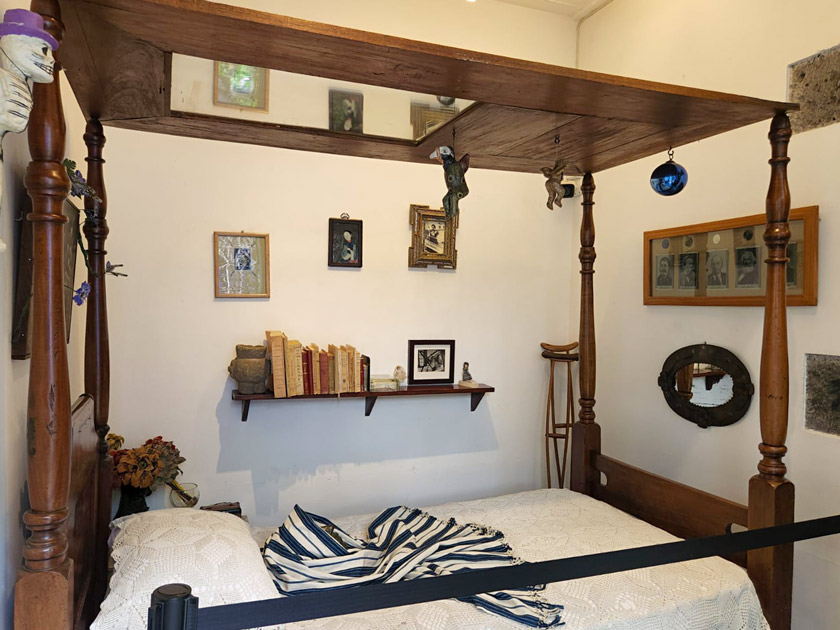
4. She had a pet deer named Granizo
Among her exotic animals (monkeys, dogs, parrots) was a tame deer in her garden at Casa Azul.
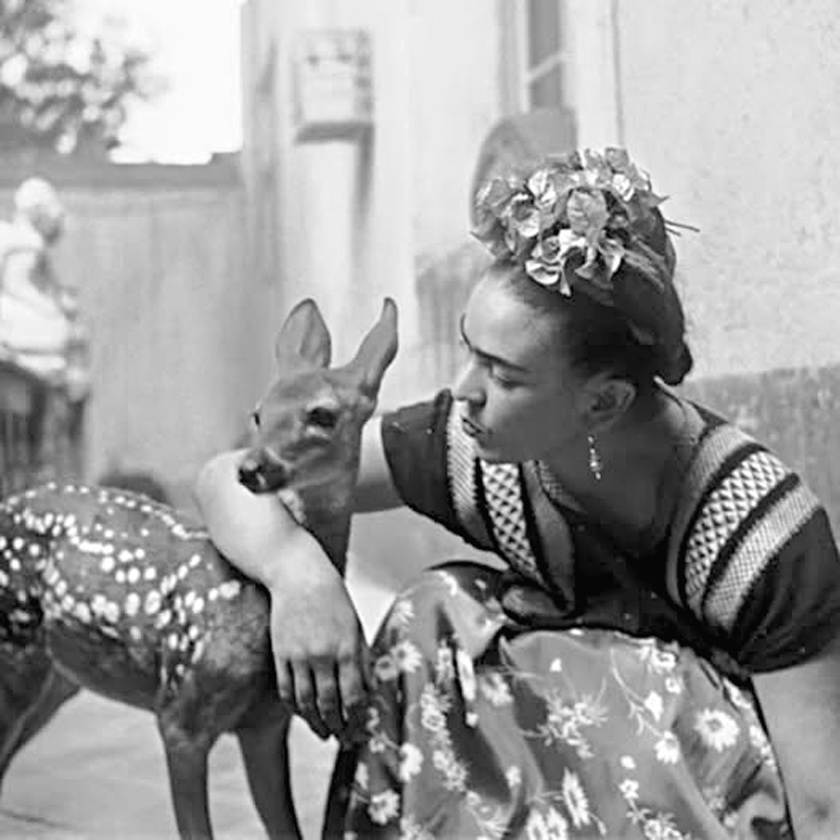
5. She was close to Trotsky
Leon Trotsky and his wife Natalia Sedova lived with Frida and Diego in Coyoacán after their exile from the Soviet Union. Trotsky and Frida had a brief, passionate affair.
6. She was of multiple origins
Her father, Guillermo Kahlo, was a naturalized German photographer. Her mother, Matilde Calderón, a native of Oaxaca, had Spanish and indigenous roots.
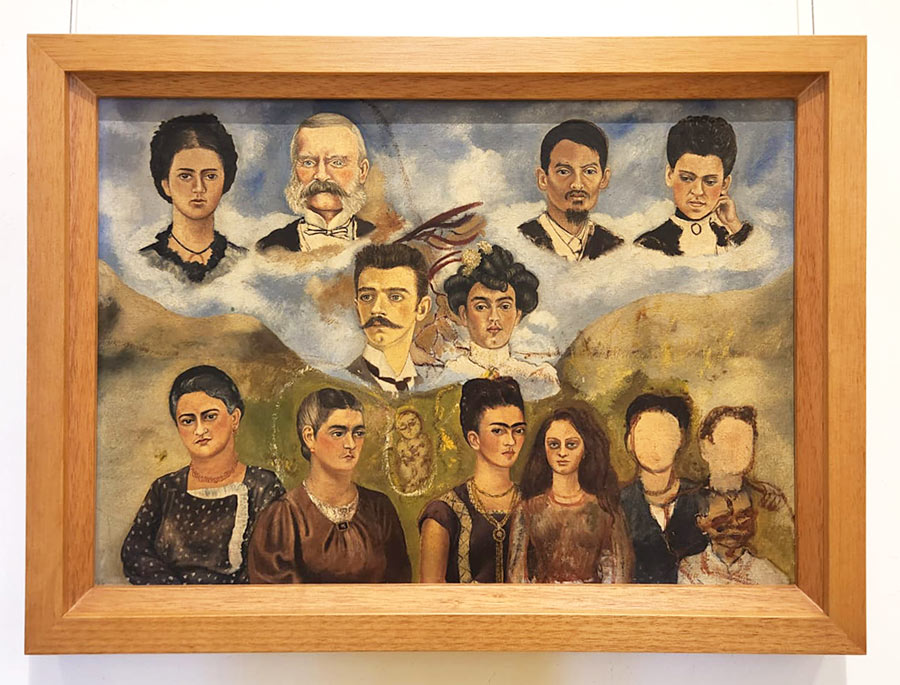
7. She took part in an exhibition… from a bed!
In 1953, forbidden to get out of bed, Frida arrived at her own exhibition by ambulance, installed on a bed in the center of the gallery.
8. She loved black humor
In her letters, she displayed a biting irony, even in the face of suffering, sometimes signing with absurd or provocative nicknames.
9. She decorated her medical corsets
Forced to wear them, she transformed them into works of art, painting them with colorful, symbolic motifs.

10. Her latest painting depicts… watermelons
Shortly before her death, she painted a still life of watermelons with the inscription “Viva la vida”. This moving painting can be seen at Casa Azul in Coyoacán.
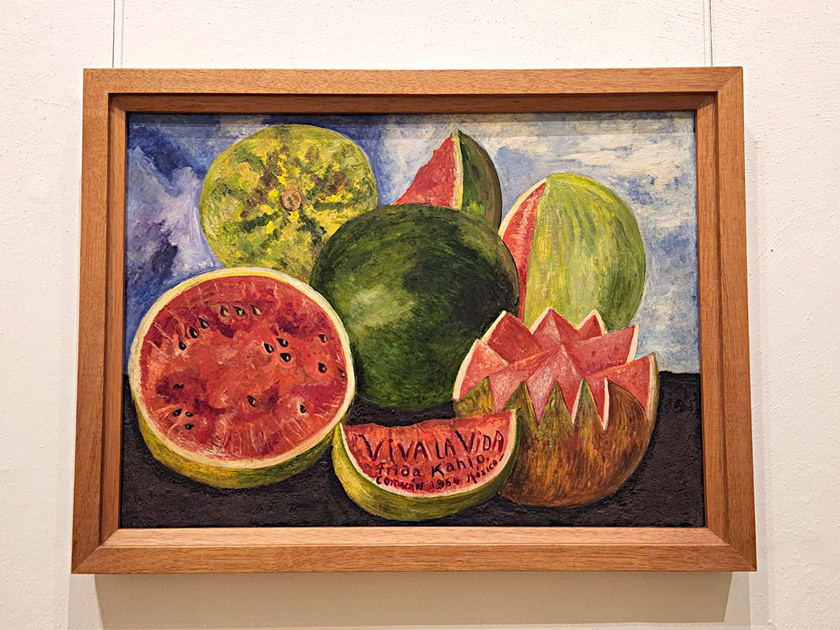
10. FAQ about Frida Kahlo
10.1 Who was Frida Kahlo?
A Mexican painter known for her self-portraits, her political commitment and her life marked by physical suffering.
10.2 Why is Frida Kahlo so famous?
For her unique paintings, her strong personal style, her avant-garde feminism and her influence on art and culture.
10.3 What is Frida Kahlo’s best-known painting?
Probably “The Broken Column”, “Diego en mi pensamiento” or “Self-Portrait with Thorn Necklace”, among the more than 200 works she produced.
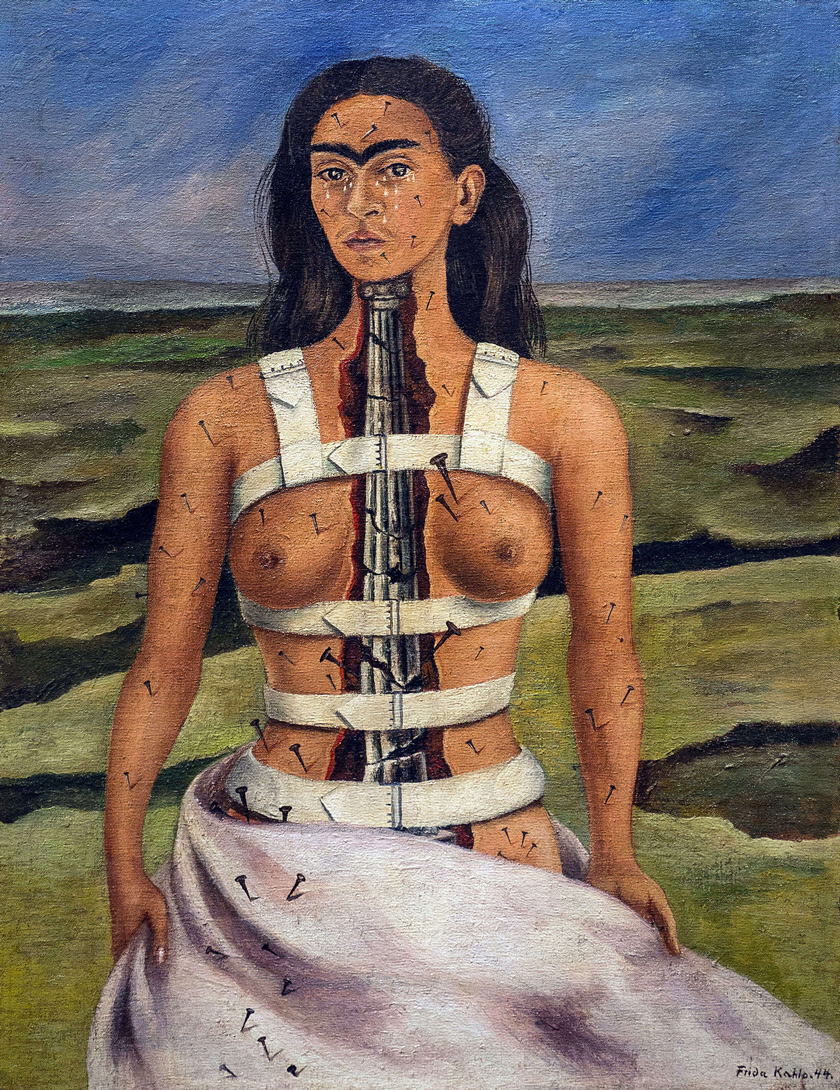
10.4 Where can you see Frida Kahlo’s work?
Her works are on show at Casa Azul in Mexico City, at the Museum of Modern Art, and will be on view again at the Dolores Olmedo Museum (reopening in 2026). Some of her paintings are also on show at major international museums such as MoMA in New York and LACMA in Los Angeles.
10.5 Can I visit Casa Azul in Mexico City?
Yes, it’s one of the capital’s most popular museums. Advance reservations are highly recommended.
10.6 Do I need to book tickets for the Frida Kahlo Museum in advance?
Yes, tickets are very limited and often go out several weeks in advance, especially during vacations and weekends. It’s essential to book your tickets online in advance.
Your best option? Choose one of these tours or tickets:
- Admission to the Frida Kahlo Museum direct, hassle-free access to Casa Azul.
- Guided tour of Casa Azul ideal for understanding Frida’s story and the objects on display in her home.
- Full tour: Coyoacán, Xochimilco and the Frida Kahlo Museum a full day of culture, art and trajinera!
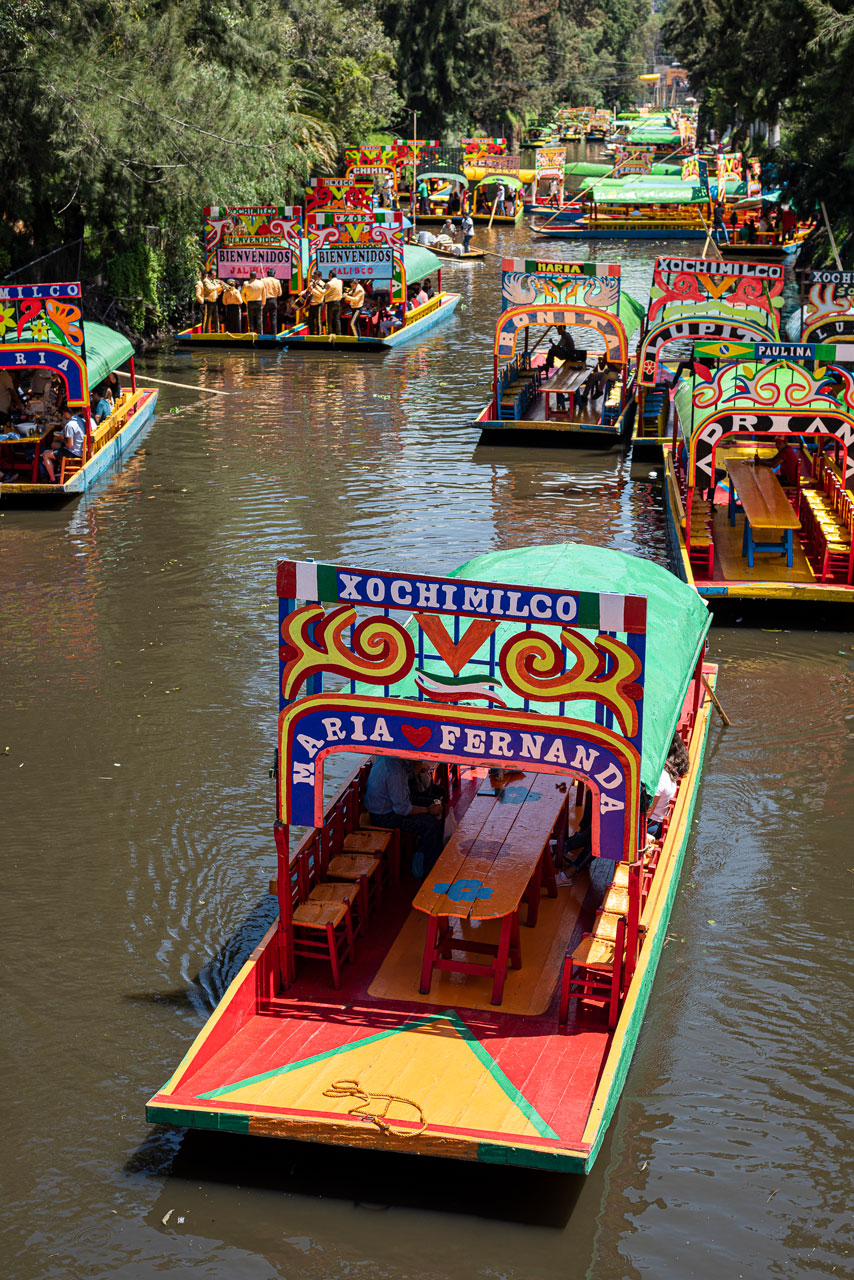
10.7 Where is Frida Kahlo’s house?
Casa Azul is located in Mexico City’s Coyoacán district. It is now a museum dedicated to her life and work.
10.8 Which film recounts the life of Frida Kahlo?
“Frida”, a 2002 film directed by Julie Taymor and starring Salma Hayek, retraces her life and made a major contribution to her worldwide fame.
Staying in Mexico City
- Hostel Mundo Joven Catedral (historic center): one of the best hostels in Mexico City. Clean dorms and rooms, amazing rooftop terrace with bar, great atmosphere and an exceptional view over the cathedral and the Zocalo, starting at 15$usd for a dorm and 32 $usd for a private room!
- Hotel Villa Condesa (Condesa): if you are looking for a romantic hotel in Mexico City, this is a little oasis in the heart of La Condesa. It is an elegant house with small green terraces and tastefully decorated rooms. Rooms are spacious, breakfast is very good and the service is particularly attentive. Around 160$usd per night!
- Casa Goliana (Roma Norte): high-end hotel with the best value for money in its category, located in an early 20th century house, typical of the Roma area. Rooftop terrace, comfortable rooms, very attentive staff, and good breakfasts. Around 190$usd per night
- Four Seasons Hotel Mexico City (Juarez): this 5 star hotel is one of the best hotels in Mexico City, ideal for a business trip or a romantic stay. Located on Paseo de la Reforma between Colonia Juarez and Roma Norte. A large indoor garden, gym, swimming pool, spa, restaurant, and bar, Around 640$usd per night!
How to find the best price for your flight ticket
Mexico City Airport officially named Benito-Juárez International Airport receives a lot of national and international flights. It is the most important airport in Latin America!
To save money on flight tickets, you can use our flight comparator for Mexico, in partnership with Skyscanner: it’s the guarantee to pay the best price for your international and domestic flights!
Rent a car in Mexico City
Renting a car is for sure the best way to explore Mexico and make the most of your stay!
While it’s not super useful to visit the city, having a car is a must to discover the rest of the country.
To rent a car, personally, I always use Booking.com Cars, for a few reasons:
- You can easily compare the rental cars prices between all the agencies: for sure the easiest way to find the best rate!
- Cancellation is often offered free of charge: no need to worry if you change your mind
- Booking Cars offers full insurance coverage at a lower price than the rental companies, so it’s an instant saving with no effort
Simply click on the green button to find your rental car at the best price:
🚗 Rent a car
🗽 Book entrance tickets and guided visits
🏄 Book your sports activities
🌍 Take a travel insurance
🙎 Book a tour
✈️ Book your flight
You’re traveling in Mexico? These articles will help you!
Discover all my articles about Mexico: All my articles to help you plan your trip to Mexico are listed there.
The 35 Best Things to Do in Mexico
- Coyoacán (Mexico City): the 20 Best Things to Do in Frida Kahlo’s Neighborhood
- Frida Kahlo Museum (Casa Azul): Info, Tickets and Opening Hours
- 1 Day in Mexico City – How to spend just 24h in the Mexican capital
- 2 Days in Mexico City – The perfect itinerary for 48h!
- 3 Days in Mexico City – The Best Itinerary + Where to Stay
- 4 Days in Mexico City – Your Four-Day Must-See Guide
- Mexico City on a Budget: Guide + All my Best Tips to Save Money
- The Definitive Guide to 40 Best Free Things to Do in Mexico City
- Day of the Dead in Mexico City: All the Best Things to Do and See
- Anthropology Museum (Mexico City): Tickets & Must-Know Tips
- Teotihuacan (Mexico City): The Definitive Guide + Tips
- How to Visit Xochimilco (Mexico City): The Ultimate Guide
- Lucha Libre in Mexico City (Tickets, Venues, Tips & More!)
- Day of the Dead (Mexico): How to Celebrate Día de Muertos Like a Local
- 40+ Wifi Cafes in Mexico City that Every Digital Nomad Should Know About
- Muralism in Mexico City: The Essential Guide to the Best Murals
- World Cup 2026 Mexico: Guide, Tickets, Stadiums + Tips
- Itinerary: 8-10 days in Mexico – From Mexico City to Oaxaca
- Itinerary: 10 days in Mexico – Mexico City, Chiapas and Yucatan
- Itinerary: 2 weeks in Mexico – Best itinerary to discover the Yucatan Peninsula and Chiapas!
- Itinerary: 3 weeks in Mexico – Mexico City, Puebla, Oaxaca, Chiapas, Campeche, Yucatán and Riviera Maya
- Itinerary: 1 month in Mexico – My Epic 30-31 Days Itinerary from Mexico City to Cancun
- Road trip in Mexico: The best itineraries for 10, 15, 21 days and a month
- Itinerary: 1 week in Yucatan – The Ultimate 6, 7 or 8 days Itinerary
- Itinerary: 10 days in Yucatan – Best Itinerary for 9, 10 or 11 Days in Yucatan
- Itinerary: 2 weeks in Yucatan – Epic Itinerary + All my Best Tips!
- Itinerary: 3 weeks in Yucatan – Best things to do in 20-21 days
- Itinerary: 1 month in Yucatan – Yucatan Peninsula in 29, 30 or 31 days from Cancun
- Road trip in Yucatan: The best itineraries for 7, 10, 15, 21 days and 1 month
You’re using Pinterest? Here is the picture to pin!
